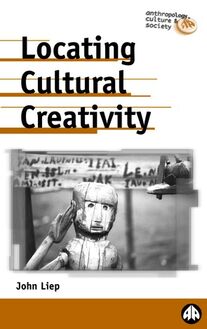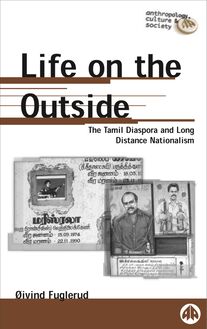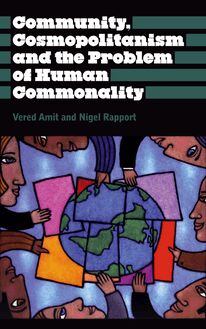Fredrik Barth , livre ebook
156
pages
English
Ebooks
2015
Vous pourrez modifier la taille du texte de cet ouvrage
Obtenez un accès à la bibliothèque pour le consulter en ligne En savoir plus
Découvre YouScribe en t'inscrivant gratuitement
Découvre YouScribe en t'inscrivant gratuitement
156
pages
English
Ebooks
2015
Vous pourrez modifier la taille du texte de cet ouvrage
Obtenez un accès à la bibliothèque pour le consulter en ligne En savoir plus
Publié par
Date de parution
20 avril 2015
Nombre de lectures
0
EAN13
9781783713066
Langue
English
Poids de l'ouvrage
1 Mo
Exploring his six decade career, it follows Barth from early ecological studies in Pakistan, to political studies in Iran, to groundbreaking fieldwork in Norway, New Guinea, Bali and Bhutan. Eriksen argues that Barth's voracious appetite for fieldwork holds the key to understanding his remarkable intellectual development and the insights it produced. The book raises many of the same questions that emerge from Barth's own work - of unity and diversity, of culture and relativism, of art and science.
List of Illustrations
Series Preface
Preface
Part I: A Man of Action
1. Watching and Wandering
2. The Power and the Glory
3. Nomadic Freedom
4. Entrepreneurship
5. The Global Theorist
6. Ethnic Groups and Boundaries
Part II: An Anthropology of Knowledge
7. Baktaman Vibrations
8. A New Kind of Complexity
9. Turbulent Times
10. Cultural Complexity
11. The Guru and the Conjurer
12. Between Art and Science
Notes
List of Works by Fredrik Barth
List of Other References
Index
Publié par
Date de parution
20 avril 2015
Nombre de lectures
0
EAN13
9781783713066
Langue
English
Poids de l'ouvrage
1 Mo
Fredrik Barth
Anthropology, Culture and Society
Series Editors: Professor Vered Amit, Concordia University and Professor Christina Garsten, Stockholm University
Recent titles:
Becoming Arab in London: Performativity and the Undoing of Identity R AMY M. K. A LY
Community, Cosmopolitanism and the Problem of Human Commonality V ERED A MIT AND N IGEL R APPORT
Home Spaces, Street Styles: Contesting Power and Identity in a South African City L ESLIE J. B ANK
In Foreign Fields: The Politics and Experiences of Transnational Sport Migration T HOMAS F. C ARTER
Dream Zones: Anticipating Capitalism and Development in India J AMIE C ROSS
A World of Insecurity: Anthropological Perspectives on Human Security E DITED BY T HOMAS E RIKSEN , E LLEN B AL AND O SCAR S ALEMINK
A History of Anthropology Second Edition T HOMAS H YLLAND E RIKSEN AND F INN S IVERT N IELSEN
Ethnicity and Nationalism: Anthropological Perspectives Third Edition T HOMAS H YLLAND E RIKSEN
Small Places, Large Issues: An Introduction to Social and Cultural Anthropology Third Edition T HOMAS H YLLAND E RIKSEN
Discordant Development: Global Capitalism and the Struggle for Connection in Bangladesh K ATY G ARDNER
Anthropology and Development: Challenges for the Twenty-first Century K ATY G ARDNER AND D AVID L EWIS
Organisational Anthropology: Doing Ethnography in and Among Complex Organisations E DITED BY C HRISTINA G ARSTEN AND A NETTE N YQVIST
Border Watch: Cultures of Immigration, Detention and Control A LEXANDRA H ALL
Anthropology’s World: Life in a Twenty-First Century Discipline U LF H ANNERZ
Humans and Other Animals: Cross-cultural Perspectives on Human–Animal Interactions S AMANTHA H URN
Flip-Flop: A Journey Through Globalisation’s Backroads C AROLINE K NOWLES
The Anthropology of Security: Perspectives from the Frontline of Policing, Counter-Terrorism and Border Control E DITED BY M ARK M AGUIRE , C ATARINA F ROIS AND N ILS Z URAWSKI
The Gloss of Harmony: The Politics of Policy Making in Multilateral Organisations E DITED BY B IRGIT M ÜLLER
Contesting Publics: Feminism, Activism, Ethnography L YNNE P HILLIPS AND S ALLY C OLE
Food For Change: The Politics and Values of Social Movements J EFF P RATT AND P ETER L UETCHFORD
Checkpoint, Temple, Church and Mosque: A Collaborative Ethnography of War and Peace J ONATHAN S PENCER , J ONATHAN G OODHAND , S HAHUL H ASBULLAH , B ART K LEM , B ENEDIKT K ORF AND K ALINGA T UDOR S ILVA
Race and Ethnicity in Latin America Second Edition P ETER W ADE
Race and Sex in Latin America P ETER W ADE
The Capability of Places: Methods for Modelling Community Response to Intrusion and Change S ANDRA W ALLMAN
The Making of an African Working Class: Politics, Law and Cultural Protest in the Manual Workers’ Union of Botswana P NINA W ERBNER
Fredrik Barth
An Intellectual Biography
Thomas Hylland Eriksen
First published in Norwegian 2013. First English language edition published 2015 by Pluto Press 345 Archway Road, London N6 5AA
www.plutobooks.com
Copyright © Universitetsforlaget 2013 English translation © Thomas Hylland Eriksen 2015
The right of Thomas Hylland Eriksen to be identified as the author of this work has been asserted by him in accordance with the Copyright, Designs and Patents Act 1988.
British Library Cataloguing in Publication Data A catalogue record for this book is available from the British Library
ISBN 978 0 7453 3536 0 Hardback ISBN 978 0 7453 3535 3 Paperback ISBN 978 1 7837 1305 9 PDF eBook ISBN 978 1 7837 1307 3 Kindle eBook ISBN 978 1 7837 1306 6 EPUB eBook
This book is printed on paper suitable for recycling and made from fully managed and sustained forest sources. Logging, pulping and manufacturing processes are expected to conform to the environmental standards of the country of origin.
10 9 8 7 6 5 4 3 2 1
Typeset by Stanford DTP Services, Northampton, England Text design by Melanie Patrick Simultaneously printed by CPI Antony Rowe, Chippenham, UK and Edwards Bros in the United States of America
Contents List of Illustrations Series Preface Preface
Part 1 A Man of Action
1 .
Watching and Wandering 2 . The Power and the Glory 3 . Nomadic Freedom 4 . Entrepreneurship 5 . The Global Theorist 6 . Ethnic Groups and Boundaries
Part 2 An Anthropology of Knowledge
7 .
Baktaman Vibrations 8 . A New Kind of Complexity 9 . Turbulent Times 10 . Cultural Complexity 11 . The Guru and the Conjurer 12 . Between Art and Science
Notes List of Works by Fredrik Barth List of Other References Index
List of Illustrations 1 . Barth as research fellow, by Gøsta Hammarlund 2 . With Kashmali in Swat, 1954 3 . With Ali Dad among the Basseri 4 . In Bergen, 1967 5 . Fur women on their way to the market 6 . First edition of Ethnic Groups and Boundaries , published in 1969 7 . With Kimebnok, the initiation master, among the Baktaman in New Guinea, 1968 8 . Bridegroom preparing for wedding in Sohar 9 . With Unni Wikan at the Ethnographic Museum, Oslo 10 . At the Ethnographic Museum, early 1980s 11 . Bhutan, early 1990s 12 . Lecturing, early 2000s
Series Preface
Anthropology is a discipline based upon in-depth ethnographic works that deal with wider theoretical issues in the context of particular, local conditions – to paraphrase an important volume from the series: large issues explored in small places . This series has a particular mission: to publish work that moves away from an old-style descriptive ethnography that is strongly area-studies oriented, and offer genuine theoretical arguments that are of interest to a much wider readership, but which are nevertheless located and grounded in solid ethnographic research. If anthropology is to argue itself a place in the contemporary intellectual world, then it must surely be through such research.
We start from the question: ‘What can this ethnographic material tell us about the bigger theoretical issues that concern the social sciences?’ rather than ‘What can these theoretical ideas tell us about the ethnographic context?’ Put this way round, such work becomes about large issues, set in a (relatively) small place, rather than detailed description of a small place for its own sake. As Clifford Geertz once said, ‘Anthropologists don’t study villages; they study in villages.’
By place, we mean not only geographical locale, but also other types of ‘place’ – within political, economic, religious or other social systems. We therefore publish work based on ethnography within political and religious movements, occupational or class groups, among youth, development agencies, and nationalist movements; but also work that is more thematically based – on kinship, landscape, the state, violence, corruption, the self. The series publishes four kinds of volume: ethnographic monographs; comparative texts; edited collections; and shorter, polemical essays.
We publish work from all traditions of anthropology, and all parts of the world, which combines theoretical debate with empirical evidence to demonstrate anthropology’s unique position in contemporary scholarship and the contemporary world.
Professor Vered Amit Professor Christina Garsten
Preface
I was meant to get to Iraq on my own. There, [Professor Robert] Braidwood would feed me and equip me with the gear I needed, as well as giving me a bit of money that I could use to continue doing fieldwork on my own. Braathens S.A.F.E. flew to Hong Kong once a week, and I thought that I might have a chance there. So I went to Mr Braathen and said, ‘Would you have room for a young Norwegian researcher who is going out with an American expedition?’ He said yes, he was keen on supporting Norwegian research, so he could give me a discount. He usually gave a 25 per cent reduction on the ticket – would that be sufficient? No, I had to confess that I hadn’t even checked the price. So he told me and asked whether it would help. I had to admit that it did not help sufficiently – and he then gave me a fifty per cent discount. And sent me off. 1
This is how Fredrik Barth recounts the prelude to his first remote fieldwork, in Iraqi Kurdistan in 1951. This fieldwork did not lead to a string of important publications, and would indeed nearly result in his early demise as an academic; but his early work in Kurdistan marked the beginning of a life’s work which is remarkably original, comprehensive and consistent. That work is the subject of this book.
Even if you did not previously know who Barth was, you felt the aura when he entered the room. When he entered the rostrum in the 1980s, we saw a tall, slim man with sharp features, a grey moustache, a hairline which seemed to recede slightly every year, long fingers and an aristocratic bearing. He never raised his voice, and frequently indulged in humorous anecdotes from the field, accompanied by a boyish grin. The content of his lectures might seem simple and easy to comprehend, but we would later understand that this was because they were carefully structured and followed a strict logical development. A lecture with Barth gave the audience the feeling of being present at a special event.
This is not a conventional biography of the ‘life and times’ kind, where the life of the protagonist is described in minute detail, with sideways glances to the social network and the zeitgeist. Rather, this book should be read as intermediate between a long dialogue and a history of ideas. The main character is Fredrik Barth (b. 1928), one of the towering figures of twentieth-century social anthropology, but his achievements and ideas must inevitably be related to broader tendencies both in anthropology and more generally. The approach is biographical, historical and dialogical. I am not a disinterested observer in this respect, but participate in the intellectual world to which Barth has made such important contributions. Since I began to study social anthropology at the Unive














